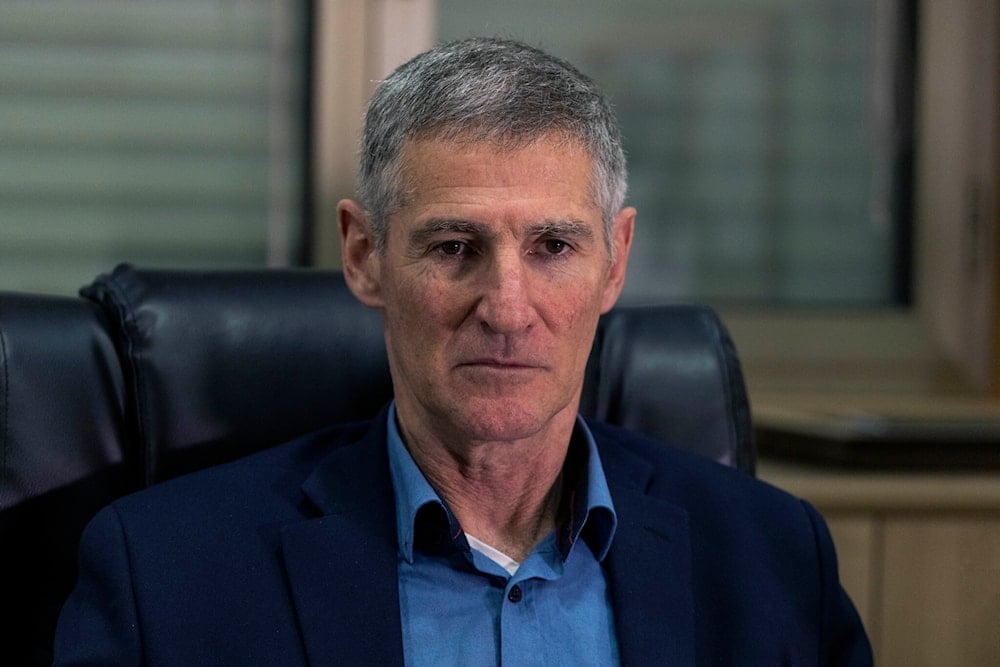Ex-deputy IOF chief not sure 'Israel is a democratic state any more'
In an interview with The Guardian, Yair Golan expressed his opposition to "Israel's" military and civilian presence in the occupied West Bank.
-

Then Deputy Economy and Industry Minister Yair Golan, poses during an interview with The Associated Press in his office at the Knesset, in Jerusalem, on January 17, 2022. (AP)
Former Israeli Occupation Forces (IOF) Deputy Chief of Staff Yair Golan questioned "Israel's" democratic status in a recent interview with The Guardian.
“I’m not sure whether Israel right now is truly a democratic state anymore. It is not a question of left or right anymore: these titles are meaningless,” the leader of the occupation's left-wing Democrats party said.
Golan expressed his strong disagreement with the occupation's military presence in the occupied West Bank, denouncing right-wing voters' support of annexation and pursuit of implementing a revenge policy following the October 7 Hamas retaliation.
“The right today in Israel is people who think we can annex millions of Palestinians, and Israel should adopt some sort of policy of revenge, that we can live by our swords and not attempt to reconcile with the Palestinians or any other hostile entity in the region," Golan said, asserting, “I think 180 degrees the opposite."
The former Knesset representative stated that although his political party advocates for the end of the IOF's military and civilian presence in the West Bank, as well as the establishment of a two-state solution, it recognizes the occupation's need for "security."
“Our vision is a two-state solution, but right now we are a nation in trauma,” Golan said. “People lost their sense of security; people do not trust the IDF to protect them. We need to be proactive militarily, but at the same time we need to combine it with political vision.”
“The liberal camp in Israel is still alive,” the former chief said, insisting, “We do not fight for revenge. We fight for the security of Israel.”
Dark future awaits 'Israel' after war on Gaza, Foreign Affairs says
In a recent analysis, Foreign Affairs magazine painted a picture of the Israeli regime's future in the wake of the war on Gaza, predicting a potential "demise of Israel" and a "dark future" marked by internal instability and increasing global isolation.
The magazine argues that Operation al-Aqsa Flood by the Palestinian Resistance on October 7, 2023, struck the Israeli occupation at a moment of profound internal turmoil. It highlights the deep divisions within Israeli society, exacerbated by Prime Minister Benjamin Netanyahu's push for controversial judicial reforms aimed at significantly curtailing the Supreme Court's authority over government actions.
These proposed judicial changes ignited widespread protests, revealing a nation deeply fractured along political lines. According to Foreign Affairs, the ongoing conflict with Gaza has only served to "intensify political divisions within Israel," setting the occupation on a "dangerous and unsustainable trajectory" that could lead to capital flight, brain drain, and escalating internal tensions.
The magazine warns that the Israeli occupation could be on the brink of transforming into a fragmented state, with far-right religious and nationalist groups potentially establishing their own de facto governance, particularly in West Bank settlements. In a more dire scenario, Foreign Affairs speculates that the Israeli occupation might face a violent civil conflict, pitting armed religious extremists against official state institutions.
Israeli settlers break into prison to release IOF soldiers
Earlier, on July 29, footage revealed dozens of Israeli settlers breaching the military court building to forcibly release Israeli soldiers charged with raping Palestinian detainees, despite the court having significantly reduced their sentences due to pressure from right-wing figures, particularly ministers Ben-Gvir and Smotrich, who sought to prevent punishment despite the convictions.
The presence of competing security forces and weakened parliamentary oversight is expected to undermine the Israeli security apparatus overall, potentially leading to the collapse of its governance structures.
While a full-blown civil war has not yet materialized, Foreign Affairs cautions that the Israeli current path will likely result in prolonged instability and economic collapse, potentially leading to its failure.
On the international stage, the magazine notes that the Israeli occupation is becoming increasingly isolated. Despite ongoing support from key allies like the United States, Foreign Affairs asserts that negative global public opinion, coupled with growing legal and diplomatic challenges, will further marginalize the Israeli occupation internationally.
The magazine concludes that while the occupation may find itself politically and diplomatically isolated from much of the global community, including most G7 countries, it is likely to continue receiving economic support from a select few nations, with the United States leading the charge.

 4 Min Read
4 Min Read








